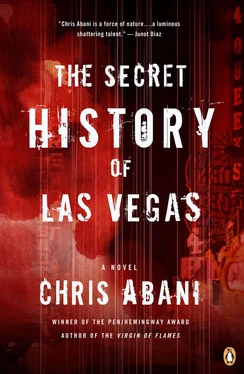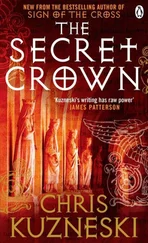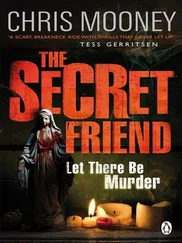They drove through the desert, lost and turned around, for a couple of hours. Finally they pulled up to the outskirts of Troubadour. Sunil and Salazar were tense from the many unspoken things that haunted them both.
They edged past houses blown apart by time and neglect, and others held together by the obstinate will of a rusting hinge dangling a window, or a door leaning drunkenly against a lintel, while in places roofs collapsed politely like deflated soufflés. Past weeds that grew tall from floors, past rusted and stripped cars that still hugged driveways and street corners with the dogged belief of a Jehovah’s Witness awaiting the Rapture. They were both silent.
As the road they were on wound even farther away from the freeway, they rolled past a graveyard of signs — giant high-heeled pumps with CASINO printed on the side in pinks and garish purples, studded with holes where neon bulbs used to live; a blue-suited fat man with pince-nez glasses, ruddy cheeks, and a leering smile lying prone as though the giant doughnut in his hand had pulled him over; a rusting fairground ride with cracked teacups; a sign in chipped green glass with the legend CARLOS O’KELLY, AUTHENTIC IRISH MEXICAN FOOD under a shamrock from which a taco shell sprouted; a seven-foot-tall duckling mouth open in mid-squawk, wings spread wide, in a yellow so bright it hurt to look at, standing among a litter of dead trucks, like a bath toy thrown from a kraken’s bathtub; MOTEL, HOTEL, GOLDEN, LAS VEGAS, EMPIRE, fragments of signs lost in the glossolalia; and the creepiest thing either man had seen, a twenty-foot-tall corpulent king who seemed a cross between Santa Claus and Henry VIII, beckoning with one hand, maniacal eyes wide open and crazed, lips curled back to reveal large white enameled and rusting teeth.
What the fuck, Salazar said as they drove by.
It’s as if Vegas came here to die, Sunil said.
Well, I guess we are in the right place, Salazar said. Even the fucking art is about freaks.
The road veered right around a large rock, and when it opened up again, there was the town, spread out before them like a lingering death.
Fuck me, Salazar said.
Extending backward from Main Street was a town with a well-laid-out network of small streets, all lined by houses, or the remains of houses. A few tenacious trees hung around, but for the most part it was just desert chaparral. Some houses looked well maintained, even lived in, and several sprouted satellite dishes. Even from where they were, they could see an airstrip with a crashed plane covered in graffiti to one side. The faint sound of music came from the town, a solemn guitar strum and a plaintive voice. Salazar pulled to the side of the road under the WELCOME TO TROUBADOUR sign.
Do you hear that too, or is it just me?
I hear it, Sunil said. Why are we stopping?
I need a minute here. I mean, aren’t you creeped out by this? Plus, it’s getting dark.
All the more reason to press on and get out of here as soon as possible, Sunil said.
Okay, Salazar said, but he checked that his gun was loaded first.
Sunil smiled. It was always the loudmouths who were the cowards.
As they headed into town, the sky was an indescribable palette of colors that brought a lyrical tint to the reality below, so that the poverty appeared romantic, artistic, and chosen. It was an alchemy that made denial easy, an alchemy that Sunil was practiced in. How else could people live the way they did in South Africa when they were surrounded by the chaotic set designs of the townships and shanty towns that circled the hearts of cities like Johannesburg.
He was reminded for a moment of Eugene and his love for Dante and the circles of hell. He hated to admit it, but Eugene had been right in his choice of Inferno, except their interpretations differed. Where Eugene saw only the internal battle of the privileged soul, Sunil saw the entire architecture and structures of racism and apartheid: three concentric circles of life and economics. Color-coded circles for easy understanding, whites at the heart, coloreds at the next remove, and finally, the blacks at the outermost circle; the closest to hell — the strange inverse sense of apartheid.
All the banks, businesses, and shops of any merit were at the heart of the circle. At one remove, the colored towns, a perfect ring of defense around the white heart. The coloreds were not white but overwhelmingly wanted to be, and even if it was not exactly white they wanted to be, they did want their privilege; and at least they were one up on the blacks. As in any free market, the coloreds were the middle classes, as it were — those who would give their lives to maintain the status quo, a life they knew they could never improve but which had meaning only because there were those who suffered worse; that in fact, a larger population suffered worse. Sunil knew of course that not all coloreds were middle class, but they could at least all dream and aspire to it. In the outer ring of hell, yet closer to the flames, in an orbit so cut off from the benevolence of the heart of apartheid, mired in a poverty they could never gain enough purchase to dream an escape from, were the blacks. And they had to bus into the heart every day to work for the whites, following only one or two access points, where they were policed and harassed to make sure they had the right passes and work papers. They spent 60 percent of their daily income on transportation alone, and since there were no legal supermarkets or shops in the third ring, they had to spend 20 to 30 of the remaining 40 percent on food in the white heart, or sometimes, and only sometimes, in the colored towns, where the prices were even higher but where there were more shops willing to take their money. Then they had to try to make it home from the heart, through the second ring that loved nothing more than to harass and degrade them, so that if they were lucky, they made it home with one-tenth of their income. Those who were more daring walked ten miles or more one way from Soweto to the outer rings of the second level and then rode buses in — a long column of ants carrying their misery on their heads wrapped with the workloads, trailing the side of the road, inhaling the dirt of the passing cars and the inclemency of the weather; all this to keep a tenth of the money they worked so hard for. And as they tried to make ends meet, the white heart grew wealthier and wealthier because almost none of the money ever left it; what spilled over, the second ring mopped up very quickly, long before it could even trickle out to the third.
While there were some rich and middle-class blacks in Soweto, they accounted for fewer than 3 percent of the township’s entire population, a population larger than the neighboring country of Zimbabwe.
The crazy thing was, the blacks made up 90 percent of South Africa’s population, which, as it turns out, the whites thought worked for them, because such a large population, kept so far removed from power and divided by hunger and fear, could never fully rise up in opposition. Turns out the whites were wrong. Sunil often thought about America and how the lie of the equality of material conditions would lead to big and violent rifts in the country. Time was the only variable in every equation of power and oppression — how long before the pot boiled over.
This variable of time is something those with power know well and learn to exploit with great measure. Sunil found from experience that the easiest way to do this was to corrupt slaves into tyrants, regardless of their race or imagined position. It worked well in South Africa, on the whites as well as on the blacks, because even though the whites thought they were free, they weren’t. In America, too, the improvement of material circumstances, and the gentle padding of minimal power, could seduce even the most cynical citizen. For the blacks the reward was even less: more work than their contemporaries. But work that affords only the essentials, no matter how much better than your neighbors it makes you, can never lead to freedom.
Читать дальше












